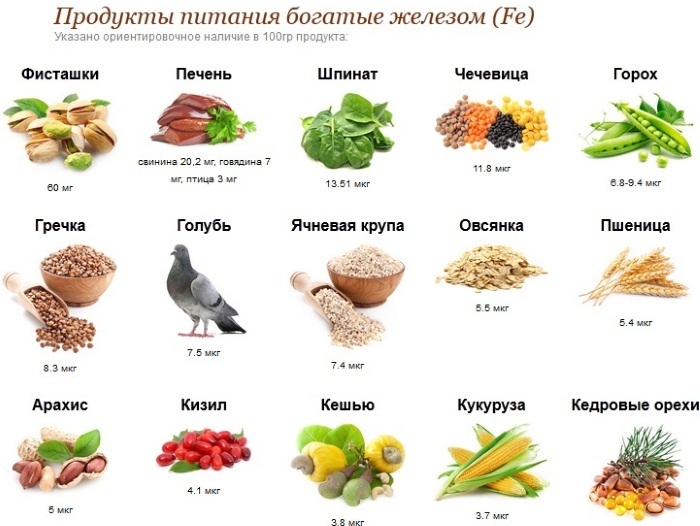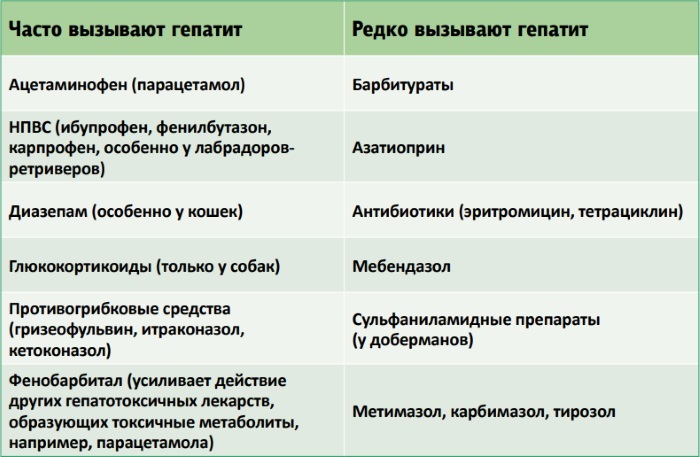Total protein is an important element in human blood. With the help of this indicator, it is possible to assess the general state of the human body. Various reasons can contribute to the lowered indicator.
Record content:
- 1 Proteins in the blood
-
2 Diagnostics and indicator norms
- 2.1 In an adult
- 2.2 In children
- 2.3 In pregnant women
- 3 The main reasons for the decrease in the level
- 4 Factors affecting the increase in the indicator
- 5 Possible consequences
-
6 Recovery methods
- 6.1 Medication
- 6.2 Diet
- 6.3 Folk remedies
- 6.4 Vitamin complexes
- 7 Specialist recommendations
- 8 Total Protein Videos
Proteins in the blood
Total protein is lowered in the blood (the reasons for this often lie in the development of pathology of internal organs) occurs in children and adults. A close relationship of indicators and the state of the body is observed due to the importance of protein metabolism in the human body.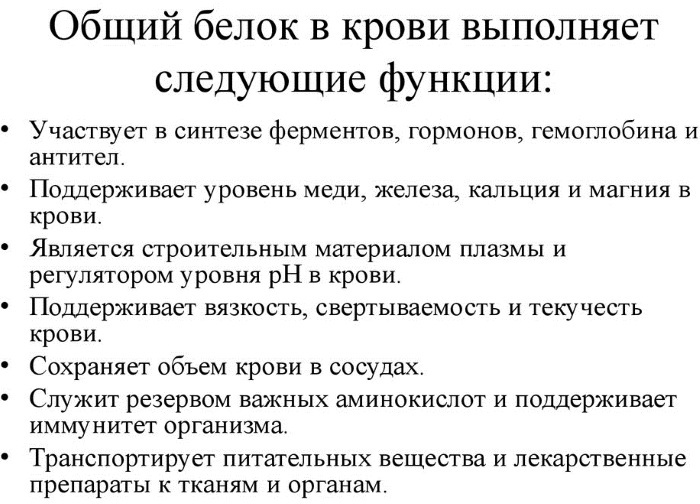
Proteins have a number of important functions:
- Construction. Proteins are involved in the formation of new cells in the body.
- Metabolism.
- Maintaining immune defenses.
- Regulation of oncotic pressure.
- Maintaining hemostasis (constancy of the internal environment of the body).
- Digestive (digestion of food).
- Transfer of nutrients to body tissues.
- Energy (proteins enter the body with food and saturate with energy).
- Regulatory.
Diagnostics and indicator norms
The study of blood serum to assess the concentration of protein is carried out for the diagnosis of pathologies, tracking the dynamics of treatment, prevention of diseases, with dynamic observation of pregnant women.
Indications for conducting a study of the level of total protein are:
- Diseases of the joints.
- Evaluation of the patient's treatment results after burns.
- Prevention of gestosis in the second half of pregnancy.
- Diseases of the cardiovascular system.
- Suspicion of an oncological process.
- Pathological processes in the liver (the presence of hepatitis, including viral).
- Chronic kidney disease (pyelonephritis, glomerulonephritis, chronic renal failure).
- General depletion of the body along with weight loss (anorexia, oncological cachexia).
- Diagnostics and dynamics of treatment of acute or chronic infectious diseases.
- Preparation for research:
- Do not eat for 10-12 hours before the study.
- Donate blood in the morning.
- Refuse protein food 4-5 days before the test.
- Do not take any medications on the day of the study. The exception is drugs that are vital for the patient.
- Refuse physical activity the day before the study.
- Do not drink alcohol or smoke before taking the test.
- Do not drink coffee, tea, juices on the day of the study. You can only drink non-carbonated water.
- If you have symptoms of an infectious disease, inform the doctor or nurse of the medical institution about it.
Venous blood is taken for analysis. This analysis is called biochemical, according to its results, the level of biological substances in the body is assessed.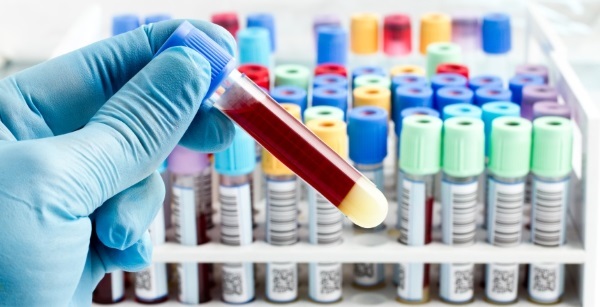
The time frame for obtaining results varies depending on the medical institution. Biochemical analysis is prepared from 4 to 7 days. Indicators can change not only with the development of pathological processes, but also for physiological reasons.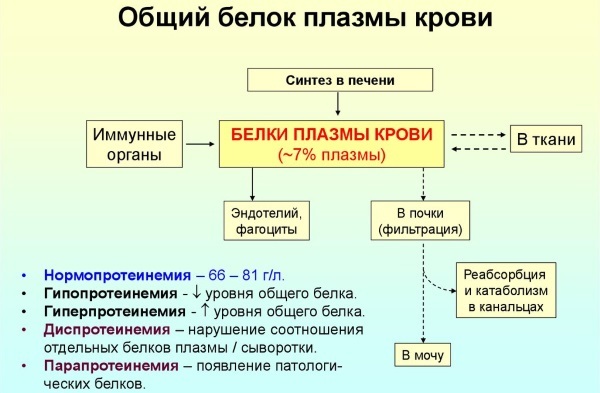
These include:
- Environmental impact (abrupt climate change, too hot or, conversely, cold weather).
- Floor.
- Genetic predisposition.
- Long sleep.
- Food.
- Physical exercise.
- Pregnancy.
In an adult
Total protein is lowered in the blood (the causes in adults can be numerous) under the influence of the following factors:
- Chronic diseases.
- Hormonal background.
- Physical exercise.
- Malnutrition.
For an adult, the normal value of protein in the blood is between 66 and 83 g / L. In people over 65, protein levels range from 60 to 80 g / l. Indicators may vary depending on age and gender. In women, protein levels can be influenced by hormone activity.
In children
In children, a decrease in total protein may be a physiological event that does not require any treatment. With age, these indicators are adjusted and come back to normal.
Indicators by age are as follows:
- Newborns 35-60.
- Children under 1 year old 50-65.
- Children from 1 to 2 years old 55-70.
- Children from 2 to 14 years old 65-80.
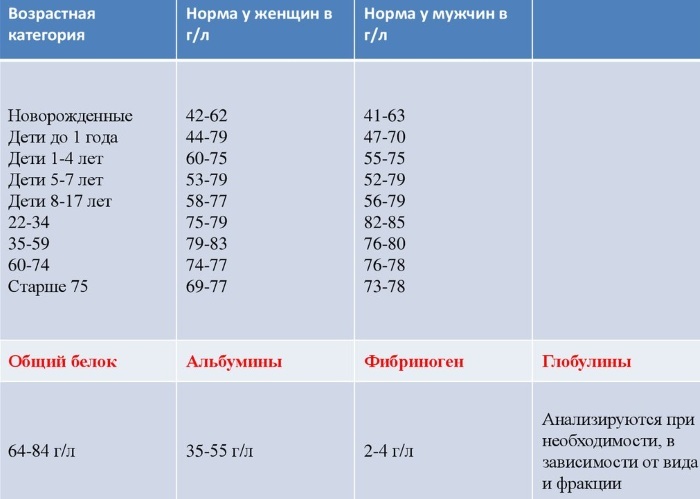
Fluctuations in total protein in children may be indicative of acute infections and kidney disease. These pathologies are most common in this age group. With changes in the blood test, a thorough diagnosis and treatment of the cause is carried out.
In pregnant women
A biochemical blood test is a mandatory study during pregnancy. With its help, you can identify deviations from the norm that can lead to complications from the health of the mother or fetus.
A blood test is carried out once a month when visiting an antenatal clinic, as well as when pathological conditions are detected (detection of protein in urine, presence of edema). Normally, the level of total protein in the blood of pregnant women ranges from 64 to 80 g / l.
During pregnancy, a decrease in protein in the blood is very often observed. As a rule, this should not be alarming if the decrease is small.
Most often, a decrease in total protein occurs in the 1st trimester of pregnancy, since during this period the woman's body is just beginning to adapt to its new state. Often, women experience toxicosis in the first half of pregnancy in the period from 5 to 16 weeks. The pregnant woman is worried about nausea and vomiting, food intake is disturbed.
And also a decrease in total protein can be in the 3rd trimester, due to an increased load on the body. During this period, special attention should be paid to the condition, as the load on the kidneys increases. Often, women develop gestational pyelonephritis after 30 weeks.
This is a condition in which the passage of urine is disrupted due to stenosis of the ureter by an older child. Because of this, intense inflammation develops, in which the amount of protein in the urine increases and in the blood decreases.
But there are pathologies in which hypoalbuminemia is a formidable symptom. A decrease in protein is observed with gestosis. This is a dangerous complication of pregnancy that can threaten the development of preeclampsia and eclampsia. With the development of gestosis, an increase in protein is observed in the urine, and in the blood its concentration, on the contrary, is low.
A decrease in indicators is observed with an unbalanced diet, toxicosis. Often a woman cannot eat well due to constant nausea or vomiting. This condition is corrected with medication or diet.
Hyperalbuminemia during pregnancy is observed in acute infectious processes, dehydration.
The main reasons for the decrease in the level
Protein deficiency is a rather serious pathological condition, which is manifested by the following symptoms:
- Weight loss. Weight loss can be dramatic or gradual.
- Dry skin.

Hypoproteinemia is when total protein is low in the blood - Breakage and hair loss.
- Nausea and vomiting.
- Lack of appetite.
- Aversion to certain foods (especially meat foods).
- Pain in the abdomen.
- Flatulence.
- Prolonged diarrhea or, conversely, stool retention.
- An increase in the size of the liver, pain in the right hypochondrium.
- Bitterness in the mouth.
- Muscle pain.
- Headaches.
- Dizziness.
- Insomnia.
- Violation of the psycho-emotional state.
- Edema (mainly of the lower extremities and in the evening).
- Frequent infectious diseases.
- Delayed growth and development in children.
- Menstrual irregularities.
- Pregnancy pathologies (toxicosis, gestosis).
The reasons leading to the onset of protein deficiency are diverse. In the total volume of diseases leading to a decrease in the level of protein in the blood plasma, the largest part is accounted for by severe somatic pathologies, which wear out the body:
| Causes | Peculiarities |
| Insufficient intake of protein in food | This is possible with prolonged fasting, anorexia, refusal to eat meat (vegetarianism). |
| Diseases of the gastrointestinal tract | A decrease in the amount of protein is observed in erosive gastritis, low acidity of the stomach, stomach and duodenal ulcers, as well as in intestinal diseases (colitis, enteritis). |
| Acute and chronic diseases characterized by a long course and depletion of the body's resources | Oncological diseases, acute infectious processes (pneumonia, sepsis). |
| Metabolic disorders | Type 1 diabetes mellitus |
| Kidney disease | Pyelonephritis, glomerulonephritis, acute and chronic renal failure. |
| Liver disease | Liver cirrhosis, liver cancer, hepatitis |
| Intoxication | When taking certain medications, chemotherapy treatment, cancer intoxication, as well as burn disease. |
| Dehydration of the body | Due to diarrhea or vomiting |
| Pathology of pregnancy | Gestosis, toxicosis |
Factors affecting the increase in the indicator
Hyperalbuminemia is the flip side of protein deficiency. There are several reasons for the increase in the level of protein in the blood.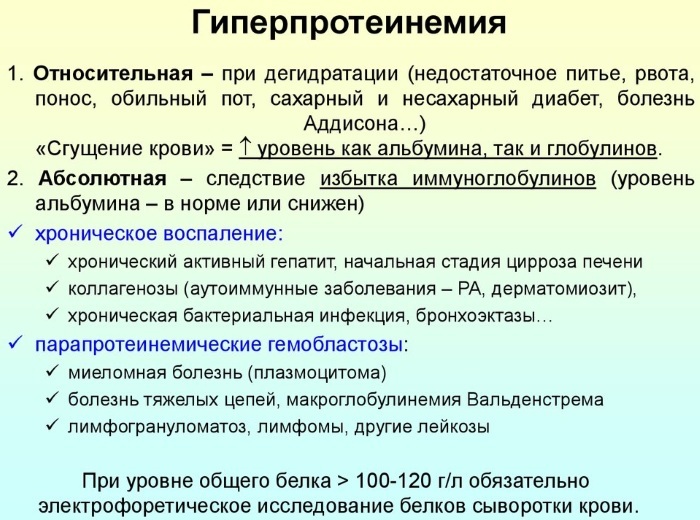
| Causes | Peculiarities |
| Acute infectious diseases | SARS, flu, tuberculosis and others |
| Autoimmune processes | Systemic lupus erythematosus, rheumatoid arthritis |
| Hormonal Disorders | Disorders in the adrenal glands, polycystic ovary |
| Emergencies | Respiratory failure, pulmonary edema |
| Diseases of the blood | Hemolytic anemia |
| Acute liver disease | Chronic hepatitis |
Symptoms of increased protein in the body:
- Nausea and vomiting.
- Increased blood pressure.
- Decreased urination.
- Dyspnea.
- Pain in the area of the liver.
- Joint pain.
- Increased body temperature.
Possible consequences
Total protein is lowered in the blood (the reasons should be established during the examination), which causes complications:
- Decreased immunity.
- Delayed growth and mental development in children.
- Asthenic syndrome (weakness, fatigue), which is observed for a long time.
- Edema, including the development of ascites (accumulation of fluid in the abdominal cavity).
- Cardiovascular diseases.
- Complications of pregnancy.
- Rapid weight loss and difficulty gaining weight.
- High risk of infectious complications (sepsis).
- Aggravation of concomitant pathologies.
An increased amount of protein in the blood can lead to the following consequences:
- Arterial hypertension.
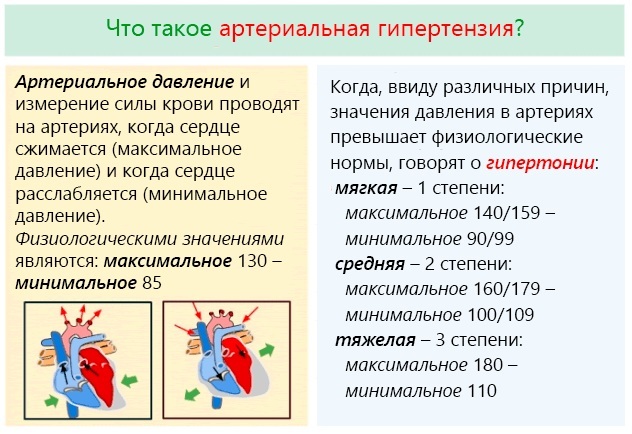
- Kidney disease.
- Cardiovascular pathology.
- Liver pathology.
Recovery methods
Treatment of protein metabolism disorders is prescribed based on the cause of this condition. Most often, medications, balanced nutrition are used for correction, and in some cases they resort to folk remedies.
Medication
Medicines are prescribed for pronounced protein deficiency, as well as if the diet does not give the desired result.
- Therapy of infectious pathologies in which there is a decrease in protein in the blood. They use antibacterial drugs, anti-tuberculosis or antiviral drugs.
- Treatment of diseases accompanied by a sharp drop in total protein (oncology, anemia). Transfusion of blood substitutes is prescribed to replace the lack of protein in humans.
- Treatment of obstetric pathologies. In therapy, antihypertensive drugs, antispasmodics are used.
- Therapy for kidney disease. The use of antibiotics is shown.
- Treatment of liver diseases. Prescribe hepatoprotectors, antiviral drugs.
Diet
Diet is the main treatment for protein deficiency. To do this, you need to include in the diet foods rich in high-quality protein.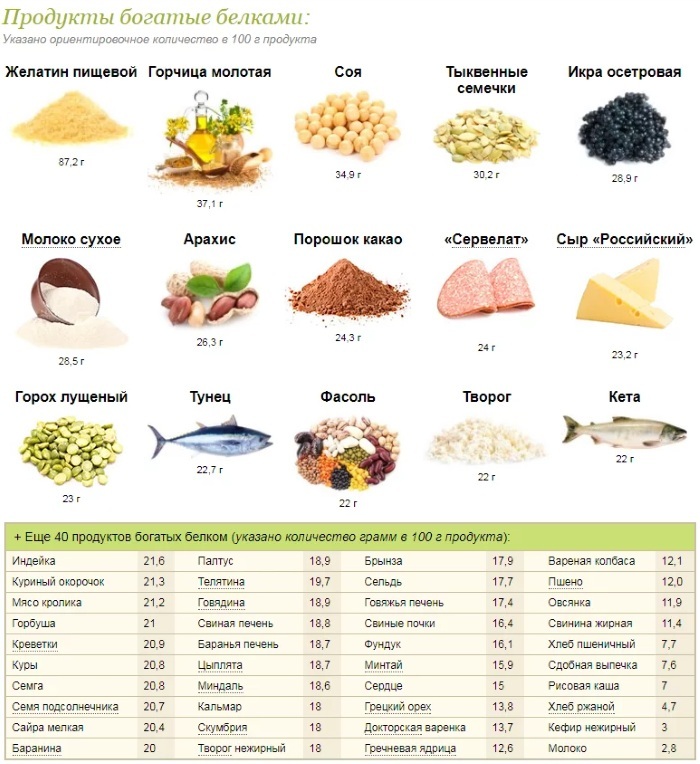
Nutritional principles for protein deficiency:
- Eating meat foods. It is recommended to include in the diet lean meats (veal, turkey, chicken). These foods contain enough protein. It is better to eat meat food 3-4 times a week.
- Inclusion of fish and seafood in the diet. You can eat squid and scallops. But when using the latter, the main thing is not to overeat, as there may be disturbances from the gastrointestinal tract.
- Eating beans. Beans and lentils contain a lot of protein.
- Choosing a side dish in the form of vegetables (boiled or raw). It has been proven that eating fish and vegetable salad garnishes markedly increases protein absorption.
- Inclusion of eggs in the diet. As a preparation, it is better to give preference to boiling eggs. So that the body is not overloaded with protein foods, eggs are eaten no more than 4 times a week.
- Timing of eating protein foods. An increase in protein digestibility is observed in the morning or afternoon. In the evening, it is better to abstain from protein, as there may be problems with the digestive system.
With toxicosis, a pregnant woman cannot eat practically anything due to a feeling of nausea. Because of this, she can lose weight, which is very unfavorable for the development of the fetus.
In addition to pregnant women, cancer patients undergoing chemotherapy or who are at the stage of cachexia can refuse food.
For such a group of people, there are basic methods to improve their nutrition:
- Eating food in small portions, but often (6-7 times a day).
- Beautiful presentation of dishes when serving. This increases the appetite.
- Cooking easily digestible dishes (soups, mashed potatoes).
- Inclusion of special high-protein mixtures in the diet. Usually they are used by cancer patients to gain weight faster for treatment, as well as to improve their well-being.
Folk remedies
Folk remedies for protein deficiency are used in conjunction with a diet and taking medications.
Total protein is lowered in the blood (the reasons can be treated with folk remedies), mostly due to the lack of normal nutrition and its level is quite it is possible to correct with natural products:
-
A decoction of corn grains. To prepare it, you need to pour boiling water over 5 tbsp. l. corn kernels, boil for half an hour, and then let it brew for 2 hours.

- A decoction of pumpkin seeds. To do this, you need to take some pumpkin seeds, pour hot water, boil until soft and take as tea for a week.
To reduce protein in urine, you can prepare an infusion of lime and lemon. To do this, mix lemon zest with linden leaves and pour boiling water over it. Let it brew for a day. And then take 1 tbsp. l. infusion for 10 days.
Vitamin complexes
Vitamin complexes are taken in conjunction with nutritional therapy. To solve the problem of protein deficiency, complexes are taken, which contain a large amount of vitamins and minerals.
- Supradin.
- Complivit.
- Femibion (for pregnant women).
Specialist recommendations
If there is a violation of protein metabolism in the body, there is an increase or decrease in total protein in the blood, you need to understand the reason that caused this condition.
Diagnosis is a very important step towards treatment. When a disease is detected, it is necessary to begin its treatment and, along the way, adjust the protein in the blood with the help of medical nutrition.
And also one of the main places is occupied by the prevention of disorders associated with the level of protein in the body.
For this you need:
- Eat a balanced diet.
- Drink plenty of fluids.
- Observe the mode of work and rest.
- Avoid stress.
- Do not overwork.
- Sleep well.
- Undergo preventive examinations once a year (with the obligatory delivery of a biochemical blood test).
- Treat foci of chronic infection.
- Rationally take prescribed medications.
- When symptoms first appear, seek medical attention for diagnosis and treatment.
The reasons for the decrease in the total protein in the blood in humans are developing pathologies. With proper diagnosis and treatment, the risk of complications is reduced.
Total Protein Videos
Malysheva about total protein:


